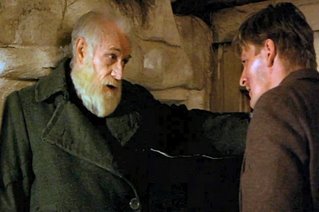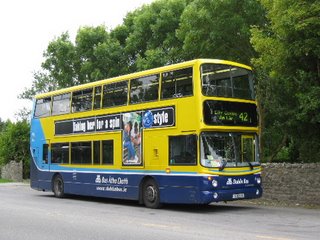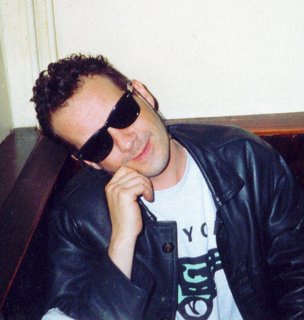 Who benefits? No guessing there
Who benefits? No guessing thereWhile, like many Dublin residents, I would rarely be averse to the belabouring of culchies with big sticks, the recent activities of the Garda up above in Mayo gave me pause for thought. The men in blue were out and about the Mayo countryside this weekend taking a breath of air and making the country safe for Big Oil. Or, as Chief Inspector Tony McNamara put it, they were defending 2 constitutional rights 'the right of peaceful protest and the right of people to access their place of work.'
Chief Inspector McNamara, doubtless a keen scholar of the Irish Constitution appears to be referring to Articles 40.6 and 45.2.i of this hallowed document. It's a shame his reading didn't extend to the bit that says
All natural resources, including the air and all forms of potential energy, within the jurisdiction of the Parliament and Government established by this Constitution and all royalties and franchises within that jurisdiction belong to the State subject to all estates and interests therein for the time being lawfully vested in any person or body.
Had the Chief Inspector been a bit more familiar with Article 10 of the Constitution, he might have been directing his men to knock a few heads in the environs of Leinster House this week.
 Garda Siochána dressed for stroll on the bog
Garda Siochána dressed for stroll on the bogFor interested readers the details of the ongoing campaign of eco-resistance towards the siting of the gas plant can be found at the Shell to Sea site on http://www.corribsos.com but what appears to have slipped off the page in coverage of the current controversy is the shoddy brokering of the deal which granted the rights and royalties associated with the Corrib gas field to Shell, Statoil and Marathon Oil for free, gratis and for nothing.
Fadó, fadó Back in the 1970s before the tigers stalked the land, Ireland had a halfway decent policy with regards to the activities of companies who wanted to exploit our off-shore resources of gas and oil. Under the direction of the then Minister of Industry and Commerce, Justin Keating, a plan was put in place to ensure that the State would receive significant financial benefits from any commercial energy finds.
Based on the Norwegian model, Keating's plan envisaged a set-up whereby the State would hold a 50% stake in any commercial find, together with royalties of between 8% and 16% and Corporation Tax at the then standard 50% rate. The Irish government was also offered help from the Norwegian Government in setting up a state oil company with involvement in the North Sea fields as a means of gaining experience in the exploitation of off-shore resources.
The state oil company envisaged in Keating's plan was eventually set up reluctantly by his successor, Des O'Malley, in 1979 but was never given the resources to function effectively. O'Malley, founder of the PDs and last heard of as director of the European Bank for Reconstruction and Development, was the man who sold the rights in perpetuity of Irish offshore gas and oil to Marathon for £500 in 1967.
Jump cut to 1987. Ray 'Rambo' Burke, well known jailbird and recipient of the odd brown envelope, is now in charge at Energy. For some inexplicable reason (libel laws prevent me from speculating) Rambo exempts prospectors from royalties and prohibits state participation in the business of exploration. If that were not enough, he offers 100% tax write-offs on capital expenditure against profits for the next 25 years. It must have been a good day in the Fianna Fáil tent at the Galway Races the year he came up with those concessions.
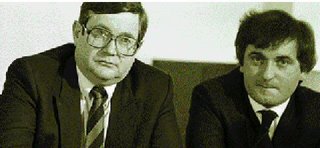 Morecambe and Wise give the oil companies a hell of a Christmas special
Morecambe and Wise give the oil companies a hell of a Christmas specialFive years on in 1992, if the oil companies hadn't already had their cake and were readying to eat it, Rambo's mucker Bertie Ahern, then Finance Minister without a bank account, adds some icing to an already sweet deal by reducing Corporation Tax for oil and gas companies down to 25%, making it the perhaps the lowest taxation rate for such ventures in the world at the time. Not of course that they'd be stumping up a brass farthing in the foreseeable future due to Burke's earlier acts of generosity. In the same year, the bulk discount scheme for supplies negotiated with Marathon was rescinded allowing producers to sell our gas back to us at the full market rate.
The licences issued around this time were what were known as 'frontier licences'. In addition to being remarkably lacking in any vestige of state control over the activities of prospectors, they also prevented the state from auctioning off rights to areas adjacent to any discoveries to the highest bidder, apparently a common practice in this business.
An interesting and often overlooked factette about the activities of Irish politicians in their dealings with the oil business during this period was the use of consultants to provide advice on how best to manage our resources. Citing national security as a reason, successive Ministers have refused to name the consultants engaged in the vital task of shedding national assets for the price of a spot in the Fianna Fail tent at the Galway Races. National security? More likely job security for a brother-in-law or two needing a leg up in the oil business.
Along came FrankIf you think it couldn't get any worse from the point of view of the plain people of Ireland, then you didn't reckon with the appointment of Frank Fahey, dodgy builder and alleged erstwhile Russian hairdressing entrepeneur. When Fahey was made Minister of the Marine it was widely rumoured that this was one post where he would find it hard to do any damage. The rumours were wrong.
According to The Village magazine, Fahey was lobbied heavily by Enterprise Oil executive John McGoldrick before the company and the gas field was sold on to Shell E&P Ireland Ltd. Fahey then ordered compulsory acquisition of lands for the gas pipeline and, wearing his Coillte hat, flogged off the land at Bellanaboy to build the cleaning plant for the gas as it comes ashore for a sum that journalists call 'undisclosed' and the rest of us would probably call bargain basement if we were let in on the secret.
I know that relations between Galway and Mayo are often bumpy,especially around the time of the Connacht Championship, but the boy from Menlo really seems to have had it in for his neighbours in the next county. For an encore he granted the foreshore license to land the pipeline and consented to the laying of the pipeline within 70m of people's homes in breach of international pipeline safety standards and best codes of practice. You can bet your life the smoking ban won't need much enforcing in those parts for many years to come.
I could go on, but you get the drift, I'm sure. I could, for example, mention the risk assessment exercise done on behalf of the state by a company which, purely by coincidence I'm sure, was partly owned by Shell or the way in which the state systematically blackened the name of Frank Connolly the director of the Centre for Public Inquiry, which published a report highly critical of the Corrib scheme in 2005, causing the CPI to lose its funding from Atlantic Philanthropies.
What really chills me to the bone is Energy Minister Noel Dempsey's recent announcement that his department has engaged the services of Indecon International Economic Consultants to assist it in its review of future licensing agreements. Indecon's chairman is Paddy Mullarkey, former General Secretary at the Department of Finance.
Mr Mullarkey was, amongst other things, chairman of the assessment panel for the Dublin Airport Terminal, a member of the committee on public sector benchmarking, and is clearly a chum of Malcolm McDowell if his appointment to the wee sinecure he holds on the Rememberance Commission is anything to go by.
He should best be remembered, however, as the see no evil hear no evil monkey who told the Public Accounts Committee in 1999 that he did not consider the problem of non-resident accounts a 'live issue' during the 1980s and 1990s and whose department in 1997 actually loosened the requirements and made it easier to set up bogus non-resident acounts.
Our Paddy is also a non-executive director of IIB Bank, the Irish subsidiary of a Belgian based banking group. In 2004 IIB underwrote a E350 million credit facility to Tynagh Energy to build, wait for it, a gas fired power station in Co Galway. Tynagh was at the time owned by Gama Construction (yes, them lads) and the beef baron Blake brothers, one of the EPA's favourite environmental defaulters.
Unless he has some kind of hidden agenda, perish the thought, Mr Dempsey must be a singlarly trusting soul if he thinks he's going to get an objective assessment or advice from Indecon.
The sad thing is that despite the well organised campaign and the justified and determined objections of the people of Erris to this project, it's not going to be stopped. Bord Gáis already have the bulk pipeline in place to carry the gas across country and any opposition will be bought or batoned off or simply have the spotlight of the media removed from them. They may not go away, but they will appear to have done so. And the banana republic of Ireland will carry on being run by the monkeys for the foreseeable future......
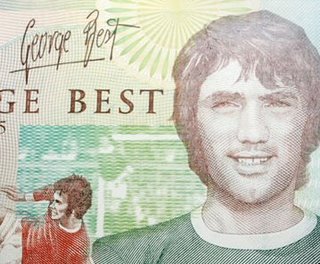 The decision of the Ulster bank to issue a commemorative fiver bearing the image of revered soccer idol, and slightly less revered liver transplantee, George Best has set me wondering what's going on up above there in the North. The notes are available from Ulster Bank from November 27th.
The decision of the Ulster bank to issue a commemorative fiver bearing the image of revered soccer idol, and slightly less revered liver transplantee, George Best has set me wondering what's going on up above there in the North. The notes are available from Ulster Bank from November 27th. 